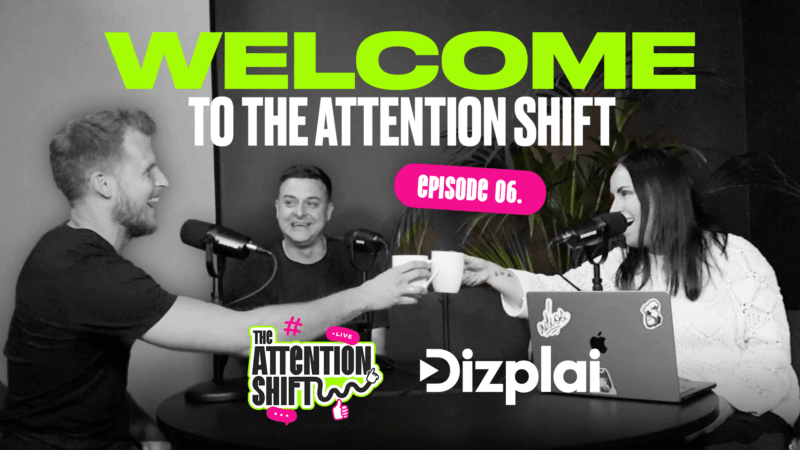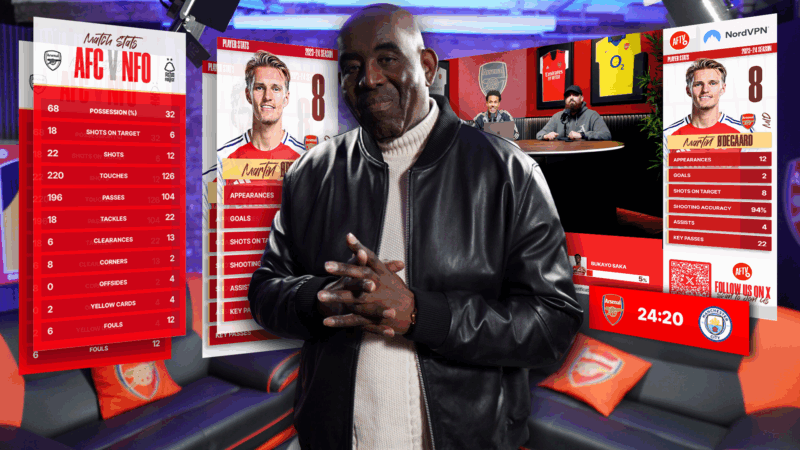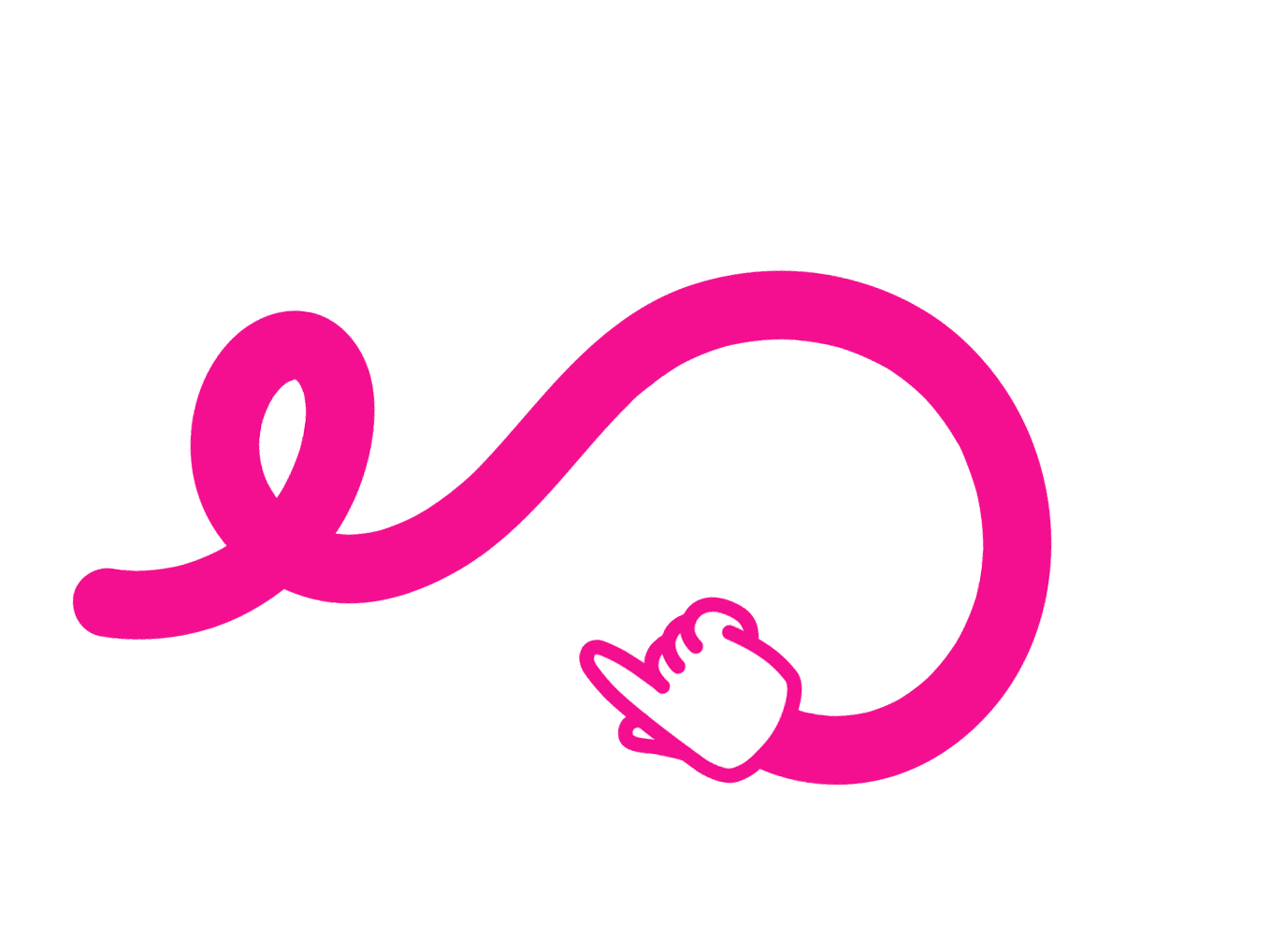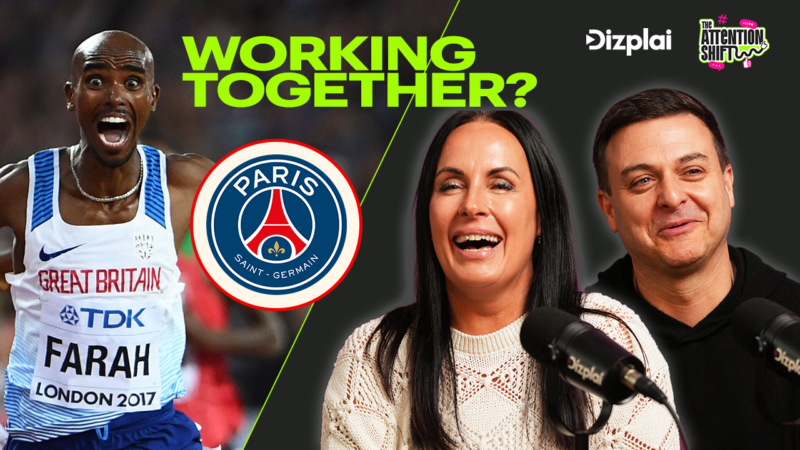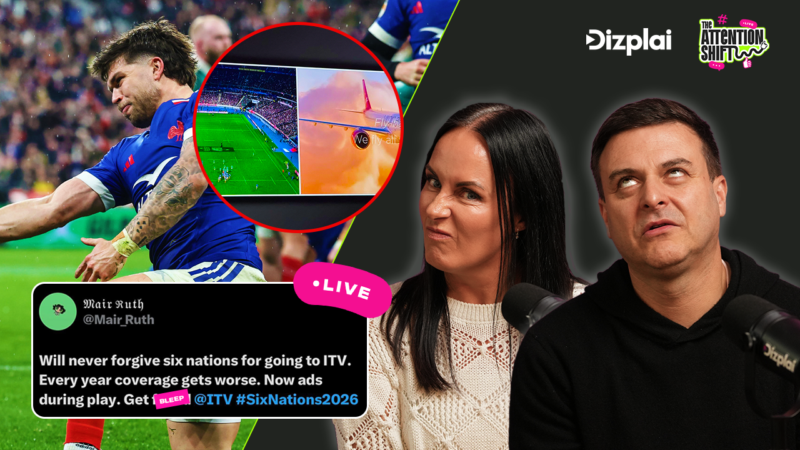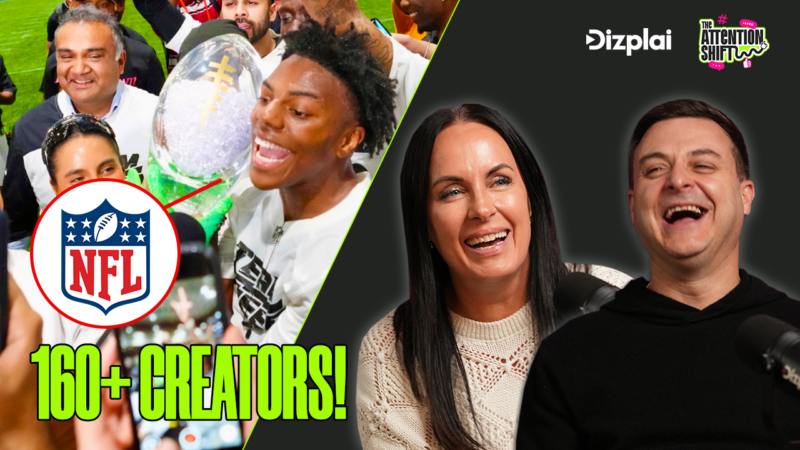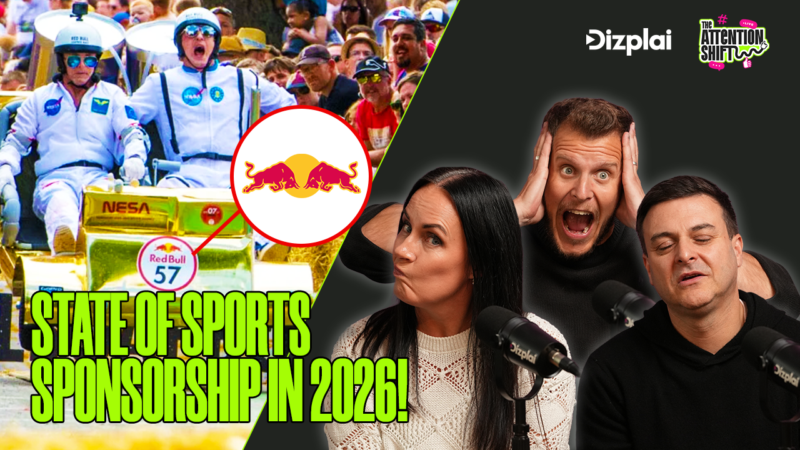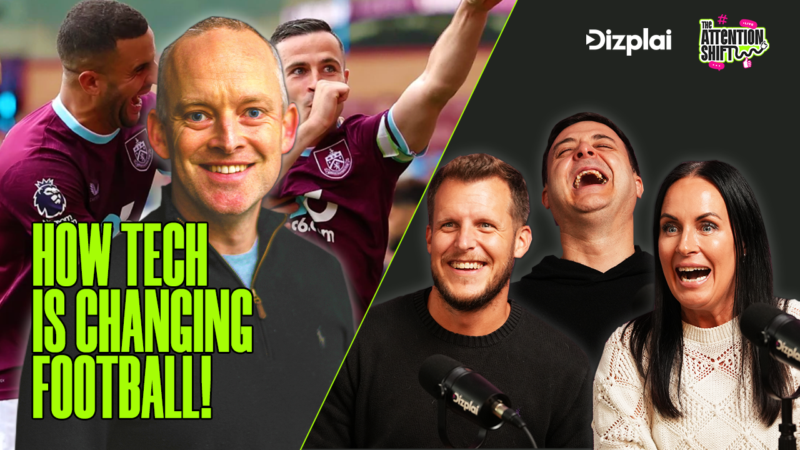
Summary
- How Athlete-Owned Media is Changing the Game: Superstars are building direct fan relationships and crushing traditional media engagement.
- The network value question: If broadcasters aren’t delivering eyeballs, what are they actually offering athletes?
- From broadcast dependence to platform independence: How athletes are taking control of their media presence.
- Traditional media models vs. direct-to-fan strategies: Which delivers real engagement in the attention economy?
- Ed, Jo & Lee explore why superstars no longer need networks to reach and monetise their audiences.
- The shifting power dynamic: Athletes as media brands outperforming legacy broadcast partnerships.
Transcription
Welcome to The Attention Shift, a podcast where sports media
gets debated like a VAR decision, passionately, longer than it should.
And with none of us fully agreeing on the outcome.
What if athletes didn’t just play the game, they owned it?
From OnlyFans to billion dollar brands.
Welcome to The Attention Shift.
You missed your vocation.
This might take a few months.
I’m envisaging you.
Now I’m envisaging you behind the decks in some kind of sequined way.
Leave it all in, Mark.
We’ll leave it in.
Yeah, leave it in, leave it in.
Right, OK.
So this episode, we’re going to talk about athlete media,
which means anything from athletes as creators, athletes as producers.
Fun fact, Kobe Bryant is the only athlete ever to win an Oscar.
Wow. I just read that.
That is a fun fact.
With an animated short called Dear Basketball in 2017.
There’s been a few that have tried acting, of course.
Some good, some not so good.
What I would say to Kobe, actually, not that there was ever part of any script
that we’ve done here now, you’ve actually said that.
If you go back and look at some of the Nike ads,
and you’re going back a while, probably 10, 15 years,
some of the very best ones that they’ve ever done,
Kobe‘s in them and he acts in them brilliantly.
Richard Branson‘s in one with him as well.
There’s one where he’s doing a lecture.
Look it up on YouTube. There you go.
Yeah. Well, there you go.
You find them and put them in the show notes.
So, well, it’s good context because clearly athletes have always been part of sports media,
but now they’re becoming even more intertwined.
They’re beginning to replace other parts of media.
I think that’s probably a bit of tension.
But what’s your view on athletes as creators?
Are they a good thing?
Yes.
Short answer, yeah.
End of episode.
Are they a good thing and why?
Because obviously there’s downsides.
Well, I think it’s actually good that you brought the Nike thing up, I think,
for a start.
Sorry, Nike.
Nike. Sorry.
I’m English.
But I think you brought up that there’s always been brand ambassadors for Adidas and Adidas
and other brands and they’ve always done that.
But I think now the format, the formula has really gone further and really changed
where if you look at historically, social media following or like Ronaldo joins Juventus,
leaves Juventus, the impact that’s had on that.
That was kind of the start of fans following players around and following people that
which they really wanted to see and the impact that had on these brands.
But it’s now gone that one step further.
And I think that’s what we’re going to deep dive into more today,
which is when they become the content creators,
when they are the media business for you and an extension of your,
in essence, your historic media rights.
So we’re talking about a shift in power, really,
because it’s all well and good when your athletes are under your control
and they’re your ambassadors, but you direct them.
They give them a script.
You tell them what to do and when and how.
But now, driven by creators on YouTube who have largely disintermediated those gatekeepers
and gone direct to the audience, now athletes are borrowing from that.
It’s far more difficult for the teams and the leagues that employ them
to put those restrictions on them.
And is that a risk?
I don’t think it is a risk.
I think often what we like from sportsmen and women,
for a variety of reasons, and it may be because they’ve been managed by their clubs,
or their teams, is that personality, that interaction that people create,
not actually understanding who they are.
But I think, look, I see it as a massive opportunity
and I don’t think one’s independent of the other or one cannibalizes the other.
And I think a friend of mine, Simon Evans,
who has a great podcast called The Soccer Business,
and again, we’ll pull that show notes, give Simon a big plug on that.
He did an interview last week, actually, with Rio Ferdinand
and Rio‘s obviously coming away from TNT Sports recently,
obviously he’s not renewed his contract with them
because actually he wants to go direct to consumer,
creating his own content channels.
And look, he was doing this when he was playing at Man U,
so it’s not a new thing for him, but he’s realized the potential of it.
You know, he talked very, very well on the podcast we sound about.
He’s very much in listening mode at the moment.
He’s looking at all ways of doing things.
He was out, you know, when Man United were two
and he was doing stuff on his phone.
He’s trying lots and lots of different formats.
He’s been doing a lot of really well shot one-to-one interviews,
lots of fun Man United plays and the boss.
So Alex is well recently as well.
And I think he’s showing that there are loads of ways
that you can create the right kind of content and give an insight
that’s not time restricted or time dependent to fans
and distribute it however you want to distribute it.
He said himself, right, kind of like, look, right,
great to be working with TNT or whoever else he’s working with
because that’s a massive platform for him.
But there is always restriction about how long you can talk about something,
how deep you can go with something, what you can talk about.
Now he’s got freedom.
Yeah, and that’s the thing.
Who needs who most at this moment in time?
Do the broadcasters or the leagues need the athletes to be creators more?
Or do the athletes still need that support from TNT or the league?
Because I think it’s going this way.
Yeah, I think generally you’re right.
I think it’s actually the athletes have more power than they realise, right?
You know, we’ve got some great stats that we can dive into on this.
But I think it depends on the league in terms of how flexible you are with this.
You know, like there is still a class, you know,
if you look at the Women’s World Cup, sorry,
Women’s Euros that just happened recently,
you know, the Lionesses done a great job about social media.
They also taught openly and honestly about mental health issues,
racism, a load of big stuff that were important to the team,
important to the players that really resonated,
you know, regardless of the debate.
And that’s probably a whole different episode of our podcast.
But that really resonated with fans and brought people into their journey
and brought them into and actually grew that audience.
You know, and I think that’s that’s a good example.
There’s other examples where I think, you know,
there’s still a lot of people trying to control the narrative around that.
You know, you’ve got Caitlin Clark, who’s made a massive difference to,
you know, going to pull some stats here for the WNBA, right?
And she is, you know,
she’s the reason people are watching the WNBA at the moment.
But is the league supporting her?
No, no, no, not at all.
Right. Let’s be honest about it.
No, she’s got 3.2 million Instagram followers.
So second in WNBA.
380% increase in video views this season
because of her, you know, 3.2 million Reels per plays per video.
You know, on TikTok, she’s increased her TikTok followers
by 61% in one month, up to 2.29
Instagram and TikTok followers.
These are crazy numbers.
And this is someone you could build a league around.
Like in the old days, they did with Jordan, you know,
like built the league around Michael Jordan and they’re not doing it.
And who’s going to lose?
There’s been a lot of problems in the WNBA as well.
And obviously, there was like, yeah, I’d love to say sex toys in a podcast.
Oh, yeah, that’s great.
There were sex toys thrown on the court.
Yeah. Yeah. Yeah.
Caitlin Clark has almost become a hated figure within the WNBA
because of a sheer scale. Yeah.
Like the people are having towards it because of her success,
which is madness, right?
Because ultimately, it should be building the WNBA for exactly what you said.
So she’s become a victim of her own success now and kind of like
you don’t know where to go with it.
Well, she’ll end up leaving.
She’ll end up going to another league.
I think that’s never what’s going to happen.
That’s the negative side of it.
Coming back to the positive again, just because
when I think about it from with my kids media hat on,
they can go on to YouTube and they can see these creators
and they get that unfiltered access.
They see all the crap they have to put up with.
But also they see the successes and the celebrations.
And, yeah, I’ve worked really hard, but now I’m successful.
Or perhaps a training session didn’t go so well.
But actually, by being candid and open and honest about that,
that teaches kids the, you know, the values of resilience.
Dusting yourself down, you get up and you go again.
And actually, that’s where I think athletes as creators can be really useful
for the future of the game, for participation, for growing
something like women’s sport again.
And actually, that’s a really positive message to give to young people
in their approach to sport, whether they become elite athletes
or just hobbyists.
So for me, it’s really important.
It is important. I think it’s important.
We talked about Drive to Survive and other things now, which is, you know,
people are leaning into much more now around that storytelling.
We talk about this all the time, about, you know, the auxiliary content,
if you like, around YouTube and how you can get that honesty.
But that’s people connect with people on a personal level.
And you’ve talked about NASCAR before, but the drive is actually quite boring.
But that’s actually kind of interesting.
But that’s really look, I’ve been lucky enough to go to a NASCAR race as well.
And anyone gets a chance.
It’s probably one of the greatest sporting experiences
I’ve ever had in my life, just the sheer noise.
And it’s look, it’s very unique.
But the driver, the driver we met was like so polite,
just had so much time, willing to answer questions
like stupid questions from Brits about NASCAR, mainly,
and but went into real detail about tyres and all the things
that we know nothing about.
And I don’t see that in the same kind of way in football.
Look, I know football is big in comparison,
but in the part of the world where they do NASCAR, they are the primary footballers.
Yeah, yeah. But they go and, you know, they go out of their way
to go and spend time, you know, where the fans are with all of their motorhomes.
And like people see them as it’s like someone they know.
Yeah. And there’s a real connection there.
Look, it’d be interesting as it has that scales over time.
You know, does that change?
But you feel like I have a connection at the moment.
Yeah, no, I agree.
And I think this this they call it parasocial relationship,
don’t they, with creators on YouTube.
This is how you feel like, you know,
this parasocial relationship with athletes can be really, really powerful.
It can be powerful, not just for kids and getting into sport
and actually showing what sport is hard work,
particularly if you get to to elite level.
I think there’s also, let’s face it, for a lot of athletes,
once their playing career is over, a lot of them feel like they are jettisoned
by, you know, the very business that has brought them that fame.
But actually, by starting to build a community as they’re a player
and through their elite playing status, surely that kind of safeguards their future, too.
Well, they’ve got such a finite career, right?
Yeah. And you’re right, Jen, is the stats, again, the stats back this up,
right? You know, Snapchat have their athlete connections program.
They’ve done analysis on this.
You know, they said 90% of fans feel closer
to athletes that they follow, you know, through going for these sorts,
specifically on Snapchat, the Snap platforms.
89% remember brands in sports content, that these names.
So there’s a monetary return for this, not just for the athletes,
but for the clubs and associations.
And 86% show more loyalty to those brands, you know.
So if you’ve got a rising star in your portfolio
or in your club or wherever it is in your league
and you’re in that in that sort of portfolio of players,
this makes a real difference.
And I think this is the connections that we’re seeing.
And I think it’s started with your Cristiano Ronaldo‘s,
your Messi‘s of the world and your Kobe Bryant‘s.
This is where it kind of starts.
But I think it’s now that one step further.
Oh, it’s evolved. Yeah.
And I think, you know, you’ve talked about Ilona Maher before
and the impact that she’s had on running.
And the Kelsey brothers as well.
I mean, it’s interesting for the Kelsey brothers
before too long.
Actually, they’ll be known by young sports fans
as only as ex-athletes.
But actually, they’ll mean more to them as as creators.
And that’s a really interesting shift.
And Ilona Maher, too, I mean, she’s still she’s still playing,
but she’s building a real solid foundation in media.
She’s got a podcast with her sisters.
They talk about all manner of things.
Her career after will have a different phase.
She’ll be an ex-athlete, but actually she’ll have built
the foundations for that while she’s in her playing career.
And I don’t see that that’s such a bad thing.
If you want to try and, you know, plant some seeds for what comes after.
Oh, definitely not.
I mean, I was going to the one I was just thinking about actually was
bizarre, it was Emma Raducanu was, you know, someone who had success
very quickly, obviously winning the US Open, got all these big brand deals.
Doesn’t really not that I’ve seen in terms of, you know,
sort of the social following or that engagement that we’re talking about.
You know, that’s all like creating your own media brand.
Obviously, the success in the court has not been as great.
Yeah, it’s picking up recently.
Is that is that the other end?
Is that the word?
I’m going to talk about the OnlyFans play.
I thought I got the sex toys.
I need to go deal with this on the web.
So we can talk about that.
But I do feel like
there’s someone who got embraced from a brand perspective, but maybe not
from a, but probably distracted her from performance.
I think there’s two sides of this. You know, you got to look at that as well.
And she would argue the other way.
But the reality is all the brands piled in on it.
So is that a negative?
Is there a negative?
So look, there’s one thing we’re talking about.
Well, yeah, what happens when it goes wrong?
Yeah, we’re talking about athletes.
Actually, I guess what we’re saying ultimately is that,
you know, having athletes as media or brand ambassadors,
it’s like, give them free rein, let them be them.
And it’s going to be the best thing that’s beneficial
ultimately in the long term for you as a league or a club or whatever.
But then you’ve got, I guess this is a more an individual layer,
you know, as a person that she did get all that success and did get all that.
And what does that mean?
You know, what does that mean?
You said it ruined her career a bit.
It’s not ruined.
I think, I think, you know, because she’s got a long way to go around.
She seems to be improving a lot.
And I hope she does as well, because I think like, you know,
I think British tennis needs it to do to do well.
I think, you know, we would love to see that.
But I think it’s probably in a lot of ways early on.
Perhaps it’s slowed the development down.
Look, it’s hard, right?
When you go and win a major slam like that, like everything
after that, it’s not going to be as good.
It doesn’t even go.
It’s just not.
So I think probably slowed it down a little bit.
But it feels like, you know, she’s young, right?
We’ve all we’ve all thought it’s hard growing up, especially
when you land like she’s and she’s had a lot of challenges
while this stuff that’s gone on as well.
So I think going to take time.
I just want to come back
actually on the Kelsey brothers as well, because obviously I’ve taken
a lot of interest in what they do and got to know Brian Verne,
who runs Wave that produces that podcast as well.
And I was lucky enough to see them not this year, last year in Cannes
where they did a they did a keynote speech.
Well, it’s a keynote chat base on Sports Beach.
And after hearing Jason Kelce talk and didn’t really know much about him
because NFL is not my game, didn’t realize that he’s got a degree
in marketing, like this guy’s a marketeer that just have to play NFL.
Yeah. Like and his brother Travis has said, like, you know,
I do what Jason tells me, like, is this guy like this guy knows
how to do marketing.
And then you look at Ryan Reynolds and Ryan who is a master marketer.
Like and he was speaking at Cannes that the year before.
He did have the keynote speech at the event.
He’s a marketeer. But these two of the
it’s a masterclass of how to be authentic and real.
And obviously, Taylor Swift, she announced the album
didn’t she on their podcast this week.
I don’t think they did it as a live or as a post because it got released.
But so she’s lent into that, too.
And like they’ve transcended, they’ve gone for sports culture.
Of course they have.
Yeah. But at what point does sport,
i.e. a league or a broadcaster,
get uncomfortable with that when they get too big.
Is there anything they can do about it?
And I think they just got to roll with it and dive in.
I think it’s just the reality is the sportsmen and women
have been just getting to the point where they’re understanding their worth.
And if I just don’t think they’ll let teams and try to buy that out of them.
Well, you say that, though, we know we on a micro level,
you know, we have clubs contacting people saying
you shouldn’t post this and shouldn’t do that.
And we’re just a little podcast.
But you know what I mean?
On a brand level, the point I’m trying to make ultimately is that
if you do they some of them have the freedom to do this stuff
and you can see it’s successful.
Others are so tight about their voice and who says what and what they do.
Are they their own worst enemies or like, well, I would say yes.
Is it going to is it going to be is this clash?
When does it change and and how what’s the impact of that change?
I mean, this is something that I’ve mused about before is when
when you see there was an up and coming NBA star
who on their journey to elite athlete status
had created a community across social platforms.
And along the way, as athletes are want to do, was offered,
you know, creative director role at a sneaker company
and really happen to like them.
It’s the kind of thing that they do. Right.
At what point?
Because then when you start getting to the big leagues,
you have to become an athlete that wears this other brand of shoe
in for in certain situations.
At some point, there’ll be an athlete that says, I ain’t doing that.
One, because my loyalty and maybe I’ve got a stake in a business over here.
So it’s in my best interest to wear their sneakers all the time.
But also my audience who know me and know how I’ve
extolled the virtues of this sneaker know I’m going to be fake
when I turn up in those ones.
And actually, it’s that’s going to do me more harm than good.
So then you’ve got attention.
That is a clash, right?
The other thing is that you say about that journey of players,
you know, there’s probably is a time to pull out the OnlyFans card.
Oh, please do, Lee.
I’m glad you were able to do that research on your own internet connection.
That’s the Attention Shift after dark version.
And not on the display internet connection.
But I think that the two examples, obviously,
the first one, obviously, was the rower who was trying to fund his
or canoeing, sorry, who was trying to fund trying to fund his Olympic.
I thought that was absolutely ridiculous.
And I think we need to actually do think we need to a whole episode
about athletes and the cost of, you know, trying to participate.
I think it’s an all episode about OnlyFans.
Can I do the homework on that one?
You can do the homework on that one.
Kareem Edwards, you want to come on and talk about it?
We’re all is. But it’s, you know, again, it’s someone who
Kareem Edwards is, you know, diversity, inclusiveness in a predominantly
white, you know, old school sport, trying to fund his way into the Olympics
and then for all that to happen.
And then even on the less sexy side, let’s say, of the OnlyFans spectrum.
You know, the cricketer who wanted to put
he’d love you for that.
You know, Tymal Mills, I’m sorry, you’re the less sexy cricketer.
But he is the first pro cricketer on OnlyFans.
But again, he’s fully clothed.
And it’s about, you know, match reflections, drills, his personal commentary.
And he wasn’t that what OnlyFans was originally meant to be about.
It was. If you don’t do an OnlyFans, I’m genuinely asking
if you don’t do something like OnlyFans, where that’s your mechanism
to make money from your content, where do you go and do it?
If you’re an athlete, an individual.
Yeah, like Patreon or something.
Yeah, yeah.
Patreon, we talked about it, obviously in Jack Conn‘s crowdfunding.
But like, you know, if you think of Kareem Edwards,
they get paid an absolute pittance to do what they do.
And I know, like, no one has to do that in his lottery funding.
But like, they’ve got to spend 10, 15, 20 years of their life
earning next to nothing, not even anywhere close.
No, it doesn’t feel fair.
How do you function? What’s the motivation?
Yeah, because there’s only three people who get medals.
Yeah, well, exactly.
And even then, like in rowing, I’d argue you’re not going to be
a millionaire then on the back of a medal.
I think it’s a struggle, right?
I mean, how many famous rowers can you name that in this system?
Yeah, well, that’s it.
But that’s where we go back to, is it?
Matthew Pinsent.
Yeah, yeah.
Catherine, I can’t remember his surname.
No, I think it’s a great point.
And I don’t think it’s fair to basically kneecap them
from earning to give themselves, one, a shot at doing
what they love, and two, a life and being able to pay
a mortgage they’re after.
No, I get this.
And that’s the thing I get.
Well, that’s, if you take the Tymal Mills example,
which is, you know, wants to put the OnlyFans logo
on his back, right?
So I get you don’t want, you know, this brand responsibilities,
there’s sponsorship deals in The Hundred and et cetera.
I get it’s a family friendly audience.
But if you think about what he was doing,
specifically his content, if you take the OnlyFans
reputation out of it, you know,
there’s nothing wrong with that.
And where does that line blur?
There’s so much control over what sponsorship
you can wear, what you have to wear,
as you were just talking about there,
or who you should wear and when you promote stuff.
These guys are the people that people show up for.
If there’s no players, if there’s no athletes,
there’s no game, there’s no match, there’s no race,
there’s no rowing, you know,
these are the people who really make the difference
and actually make you want to watch it.
And the deeper you can build that connection to them,
that only makes you more super fans,
which makes you want to buy the merchandise.
It makes you want to buy their shirt.
And it’s like this new model,
if you’re not going to embrace it,
there’s going to be pushback
or there’s going to be separation of leagues.
There’s going to be the rumours of-
I think if, and look, whether you want to pick Kareem,
you want to pick Tymal, right,
if suddenly another 20 or 30 top sports people in that,
in and around those sports start doing the same,
I think that the federation’s all got a problem.
Because I think then you start getting a bit of a tide
and look, it’s taken them to say,
this is the way that I can make money
because ultimately what I’m potentially earning
is not enough.
Or the opportunity to be just like,
why should they be stopped to do that?
It’d be interesting to see if other people pile in
and try and do it too,
but I’ve not seen anything
on the back of Kareem Edwards quite frankly.
Well, I mean, the players,
I mean, I guess that kind of leads nicely
into the other, the Players TV,
which is that athlete-owned media platform.
Yeah.
You know, it was,
they raised 3 million from 2,000,
just over 2,000 fans.
It’s valued,
the latest valuations were nearly 50 million.
It’s got, again, raised another 10 million
from half the fans that they’re watching.
It’s 70 plus athlete owners across NBA, NFL, WNBA, MLB.
And you know, they’ve got fan shareholders.
So now these guys are broken away.
They’re athletes to your personalities.
They’ve created their own media company.
They’ve now got fans with joint ownership into it.
So you now got this, you know,
this perfect storm, if you like,
of where it could break away.
And if they, if more people really tap into that,
then you know, your old leagues
and old clubs and federations,
where are you going to stand?
If you’re an old broadcaster,
you’ve got no chance.
When you think about how creators and athletes,
I mean, athlete creators, I should say,
have the most unique voice and viewpoint on the sport,
whether they’re commentating on the sport that they played
or actually some might be a fan of another sport
and be quite proficient in it
and want to talk about it.
If you’re a fan and you’re one of those fans
that’s been asked to subscribe over here
and subscribe over there,
and your subscription service,
most of it you don’t watch.
But actually, then you’ve got Bryson DeChambeau
and a load of other creators going,
well, hey, you can come and own part of this,
this channel, this platform,
and we’re going to give our take on it.
I’m already sold.
I would watch that.
You know, and you, we’ve got already,
we’ve got Bryson DeChambeau showing duels.
We were talking about that.
I was just literally talking about that.
So at some point, they are distributors, broadcasters,
athlete creators as broadcasters.
But think about what’s driven Bryson to like,
do you know when the players went into LIV, right?
They were the players who went to LIV each individual team.
And for the life of me, I can’t remember
the name of his team.
So, okay, thank you.
Correct me if I’m wrong.
The idea was that LIV obviously paid them
to come in there, but then they were given a team
and LIV were then funding that,
the operations of that team for a period of time.
And then ultimately they’d have to stand on their own
two feet.
Now I don’t, I think it was for the first three years.
I’m not sure if that’s been enforced yet.
Cause I think-
Well, there’s contracts up for renewal.
Okay.
So they’re all the major players now,
like your Rams, your Bryson‘s.
Their contracts are going up for renewal now.
So Bryson, like if LIV is still,
still LIV is all in, like Bryson‘s not going anywhere,
right?
But the thing he’s now is like, you know,
yes, he’s invested over what?
One million, I think he said, right?
With a team of 10 creating his content.
But they reckon he’s earning anywhere
between nine and $11 million a year
from the company he’s creating.
So ultimately then, like whatever LIV‘s paying
has just gone up.
Cause he’s actually worked out to turn
the thing he was given into a viable business,
but probably not in the way that it was thought
in the first place.
Well, you think what he’s done for LIV,
you know, LIV Golf, apart from the sort of upset
that it really originally caused,
like he has now been their biggest marketing growth,
growth driver, right?
Like, you know-
Like Ballerleague.
Yeah, exactly.
The creators have helped build Ballerleague.
Yeah, and that’s the thing.
They own, these are the people that bring people
and grow in their audience.
Primarily using YouTube as a primary channel
or using TikTok or Instagram, or they’re funny,
you know, that’s showing the side of the person
that people want to show you that, you know,
I still remember the old, the classic Premier League
interviews, you know, from the late nineties,
early 2000s, you know, it was a good game.
You know, we were-
Oh, I mean, have you changed that much?
No.
No, they really haven’t.
I mean, these players like Maddison,
they like to do stuff,
but it’s a very, very small amount of players
who actually lean in and show their personality
and what their love and what they’re interested in.
I mean, gosh, the only way they used to show
their personality was on the odd time
when they’d try and sneak Wham songs into interviews.
Yeah, yeah, yeah.
That was as crazy as it got.
Can you imagine the Premier League,
if we did like, you know, the Walkings,
like they’re in the NFL
and they’re all dressed up in white hats
and stuff like that.
I mean, we hate it, right?
Because it’s not our culture.
But they’ve really lent into that in the US
and that’s become a whole thing in itself now.
And I think, you know, when they see something
like that becomes a trend,
like the US is just built to just lean into it.
Like, we just, I don’t know,
we just don’t seem to be able to find a way
to lean into any of that here.
I think as far as we’ve got
from a personal perspective,
it’s certain players being gamers.
Yeah.
And you see quite a bit of that.
And they do that off their own bat
and they do connect with the fans in that way.
And, you know, you can find certain ones that-
Especially the younger players now
are much more-
Trent was doing a lot of that, wasn’t he?
When he was in Madrid,
now he’s at Madrid, so.
Yeah.
And the ones that have been open about their fandoms,
like we were talking about Noah Lyles.
He’s a big fan of anime.
Pulling out the Yu-Gi-Oh cards in the trials.
You’ve got Dominic Solanke, who does salutes,
Naruto salutes when he,
celebrations when he-
Just for you, just for you, just for your anime.
Just anime fans.
But it does, it’s a connection.
It is a connection.
It’s a passion that they have
that’s not necessarily related to what they do,
but allows them to build a connection.
But there’s only so far you can build that connection
when you’re doing it down the lens of a camera pitch side.
But if they’re creators and they go,
I mean, this is one of the things
that IShowSpeed talks about.
He’s a big gamer.
He loves One Piece.
He also loves football.
Three things that brings three different sets
of fans together and connects them to him.
That’s why he’s so, so powerful.
But athletes are the same.
So there’s a real opportunity there.
So how would we unlock this?
If you’re a league or club or a federation,
what would you be saying?
How would you,
do you say, right, support your players?
I vote for Chaos.
I vote for Chaos too.
I once suggested this on LinkedIn.
Henry, who’s the young rugby player?
Ooh, yeah.
I once suggested that-
Any suggestions from the crowd?
No, Henry, we can’t remember his name.
At this point in his career,
I suggested he should-
You must know, Harry.
What’s Henry’s surname?
Thank you.
Thank you.
Thank you, Harry.
Suggested that it might be time for him now
to start a YouTube channel to document his career.
And I got tons of comments back on my LinkedIn post
going, “No, no, he’s there to play rugby.”
He’s, you know, it would distract him.
But actually it might also bring thousands
of potential young fans into rugby
and even maybe playing it again.
So yeah, I get this-
They need support and guidance.
You know, you do need protection.
You need a level of protection, right?
I was having a chat to a sports federation today
and we’re talking about maybe going in
and doing a talk for some of the organisations
that are part of that organisation, right,
without giving any names.
And I was just talking about, “Look, right,
the reality is the world has changed
and suddenly we get down to grassroots level.”
The media footprint that was once there
before my local club just doesn’t exist anymore.
So they’re not doing what you need to do anymore.
They’re not getting your message out there.
And the only people that can do really are creators
and there are plenty of them.
It doesn’t matter how big or small
that sporting organisation is, right?
So you’ve got to embrace it,
but you need rules and regs of how you’re going to do it.
And you’ve got also to get those creators to agree to,
look, if I’m going to give you access,
I’m not saying don’t be critical, but be respectful.
And we will give you access
because ultimately I know that you can help
to push my message out.
And you know what?
If you help me to sell X, Y and Z product,
I might say with an affiliate as well
and you can earn something on the back of it too.
Now they’re fans, right?
So not necessarily looking for that,
but creators earn money like that.
So maybe they are.
There are this infinite possibility
in terms of writing regulations
around how you work with them.
I think you can standardise across the board,
but give lots of space to do it too.
And you do have to give space
because that’s the thing you can’t.
And also you can’t-
You can’t impinge creativity.
No, and you also can’t force athletes
who aren’t comfortable being creators to be creators.
Let’s also acknowledge that.
Absolutely.
Some don’t want to do it and that’s also okay.
Exactly.
But those that do, you’ve got,
some athletes might want to do
predominantly fitness content.
You might have some athletes
that talk about haircare and makeup.
Whatever their passion is,
actually they should be allowed to share that in a genuine way.
Connor Roberts, reading through his woodwork.
Now I remember when he-
I’m saying this because I’ve gone down,
I did a woodworking course recently.
Is this another one of your plans?
No.
I’ve gone down this woodworking rabbit hole now
where Dan and I and my colleague,
we went and did a woodworking course recently
and like hand made wood.
But, and he reminded me of Connor,
because when he joined Burnley,
there was quite a bit on his social channels
about how he’d done a lot of woodwork.
I’ve not seen anything since he joined
and I’m kind of like,
but I’d love you to lead me to do more of that.
Yeah, what a shame.
I missed out on the chief.
Because there’s so much you can do with that.
Like he was really good.
But that opens up an audience, right?
And he’s got such a personality as well.
So you can imagine like,
Marion is, you can see on the page,
Marion‘s personality with his passion.
We don’t see that for that.
I mean, that’s gold dust.
That’s real gold dust.
Why would you want to stifle that?
Athletes as creators don’t think it’s going anywhere.
If anything, it’s going to happen more and more.
But we’re perhaps fair to say we’re in inflection point
where the sporting organizations actually acknowledge it
and start relaxing their approach to it.
Or I think you’ll see some go rogue
and they will get so big that it will be a problem.
I think, to summarize that, I think you’re right.
I think they’ve already embraced it before,
but there’s been marquee players
that may have been signed for specific audiences
in specific countries or specific fans, specific countries
or for brand ambassadors for certain sponsors
that they’ve got on board.
Now we’re at this new level of content creators
that our athletes are.
And you have to support them in it
and you have to let them be raw and emotional,
but also give them the bound,
don’t bound them, but support them.
Be there.
So if they do make a mistake and not to…
You’ve just made me think of something
that literally happened this week.
Alisha Lehmann, left Juve, off the back of,
great season, wins and then goes to FC Como Women.
That is very much a challenger team doing well,
but stands on its own two feet as a brand.
They want her because of what she can bring
to FC Como Women.
I think you can do that in a women’s game at the moment
because it’s still growing.
In men’s game, I think it’s more difficult
because I think it’s always like,
in developed games, it’s not just about men, right?
In developed games or sports,
it’s got to be talent first,
but the reality is these people
are now becoming media companies.
And that’s where we’re seeing
the real attention shift happening.
And again, I still don’t think it’s one or the other.
I think that the organizations that they represent
can really lean into what they’re doing
to help them to get their message out.
Transition, yeah.
And I don’t think that at the moment
it’s kind of like, say this please,
but it’s like, actually,
if you get them involved in what you’re trying to say,
they’ll be way more invested in it.
The interesting thing about Alisha Lehmann as well,
because Juve‘s got a very well-established creator lab
and she’s almost gone through that.
She’s done all of the training
and now she’s taking it to FC Como.
But I don’t necessarily think that’s a bad thing
for Italian women’s football, actually.
I would imagine Juventus would be quite happy,
but Como will be doubly happy
because I imagine in the next season,
she’s going to be their star athlete creator.
So they’re actually going to lean on it quite heavily.
Cool, so to wrap up.
To wrap up then.
So we think let your athletes be creators
if they want to, if that’s the thing.
Let them talk about their niches.
Let them find their thing and support them
and comfort them that you wouldn’t in any way.
But even if you don’t let them,
they’re probably going to do it anyway.
Yeah, exactly.
Give them support and guidelines.
They’re going to do it.
You’re damned if you’re doing it,
you’re damned if you don’t.
So let them do it.
Cool.
So thank you.
Thank you for joining us on another episode
of The Attention Shift podcast.
Don’t forget to like and subscribe
and if you’ve got any suggestions
for topics you’d like us to talk about
or any feedback, good or bad,
email us at hello@theattentionshift.media.
That’s hello@attentionshift.media.
And feel free to feedback on Lee’s Open.
All the ending.
More cheese next time or less cheese.
Thank you.
Cheers.
Next time.
That’s it for this episode of The Attention Shift.
Remember to like and subscribe and listen in next time
and do let us know what you think.
Email us at hello@attentionshift.media.
So that’s hello@attentionshift.media.



